![[Updated] In 2024, Proven Techniques to Stand Out in Podcast Imagery](https://thmb.techidaily.com/a3895cce3360de5913e31306b1dac3362ecfc87f8052e7d36fccdff1f24bd61a.jpg)
[Updated] In 2024, Proven Techniques to Stand Out in Podcast Imagery

Proven Techniques to Stand Out in Podcast Imagery
Research suggests people make up their mind within 90 seconds after the initial interaction with the brand and associate it as either bad or good. Many podcasters only focus on the podcast’s content, which they should, but ignore the visual identity of the podcast.
In this guide, we will guide you to design a stunning and unique podcast cover. But before that, we will acquaint you with all the necessary elements of an eye-catching podcast cover image.
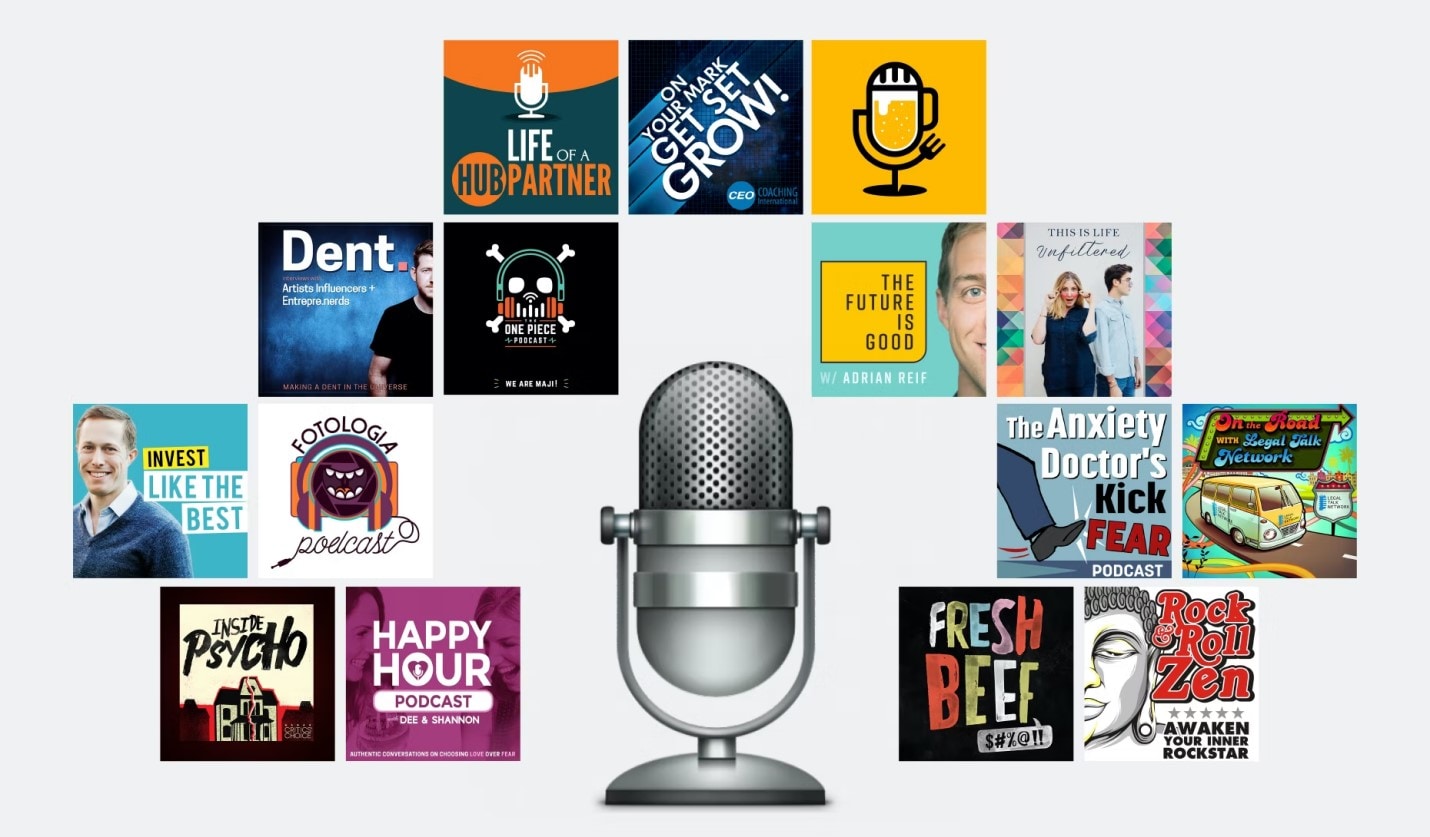
Disclaimer: This post includes affiliate links
If you click on a link and make a purchase, I may receive a commission at no extra cost to you.
Round-Up 10 Tips to Design Podcast Cover Art
These are not tips but 101 guides on podcast cover-making. All the ten key points mentioned here will enable you to create a podcast cover image that stands out and catch the user’s attention.
1. Make sure the podcast cover meets podcast platform requirements
To make your podcast accessible to people worldwide, you have to publish them to podcast platforms, otherwise known as podcast directories. For instance, Apple Podcasts, Spotify, and Google Podcasts are podcast directories.
The good thing is most podcast directories have a similar requirement for the podcast cover art dimensions, resolution, and file type. Still, some podcast directories have special needs. So, ensure to know the requirement of each podcast directory that you plan to publish your podcasts on and select the canvas accordingly.
For instance, the podcast cover size demanded by Apple Podcast is:
- 3000 x 3000 pixels
- Resolution of 72 dpi
- JPG or PNG file type
- RGB color-space
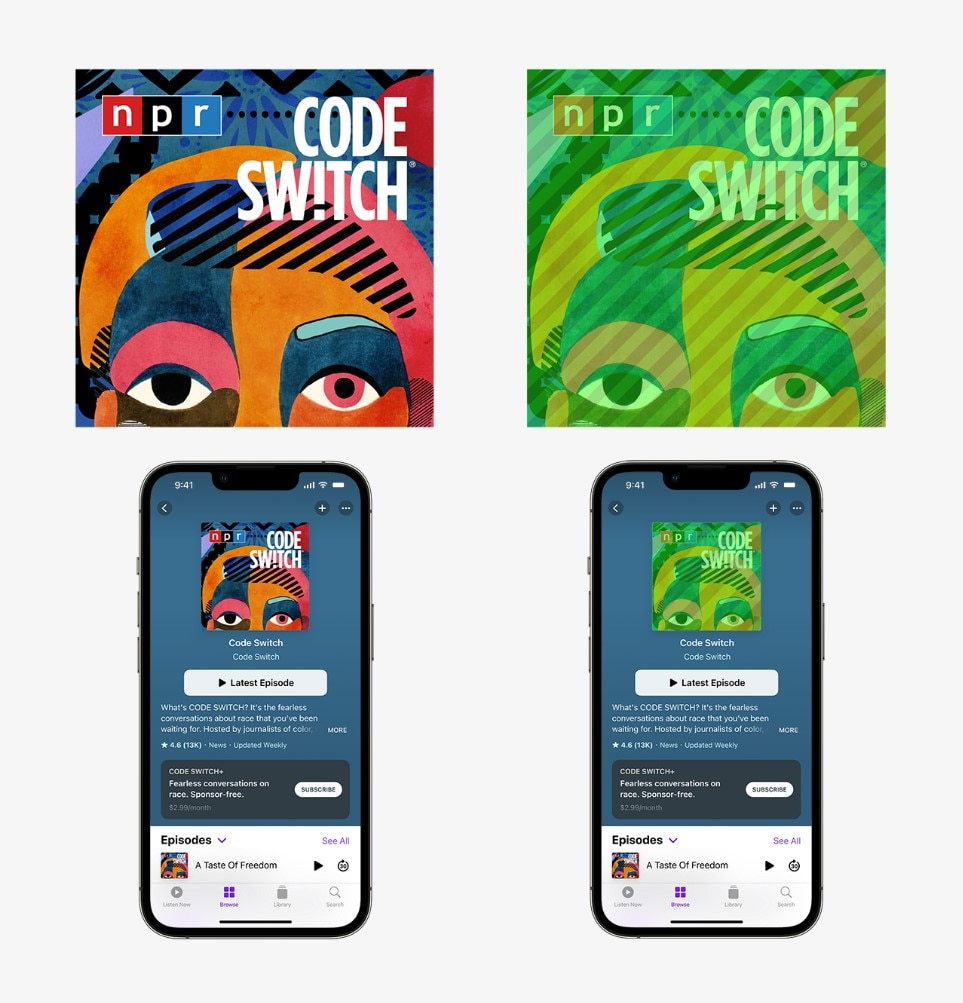
Google Podcasts, a popular podcast platform among Android users, also has the same or similar requirements for the podcast cover image. That is to say, you do not have to design a podcast cover exclusive to Google Podcasts.
Nevertheless, there are some platforms that have different requirements. For instance, Spotify mentions the following need for a podcast cover image:
- TIFF, PNG, or JPG format using loss-less encoding
- The highest resolution available
- At least 640px wide and tall
- 1:1 aspect ratio
- Encoded with an sRGB color space, 24bits per pixel, with color profiles applied directly.
Note: The thing to remember is to design podcast covers for all platforms with different requirements. It may seem daunting, but limitations and provisions often unleash a person’s creativity. Needless to say, if you are a professional podcaster and your teammates responsible for podcast cover making, then you can leave it to them.
2. Straight to the point
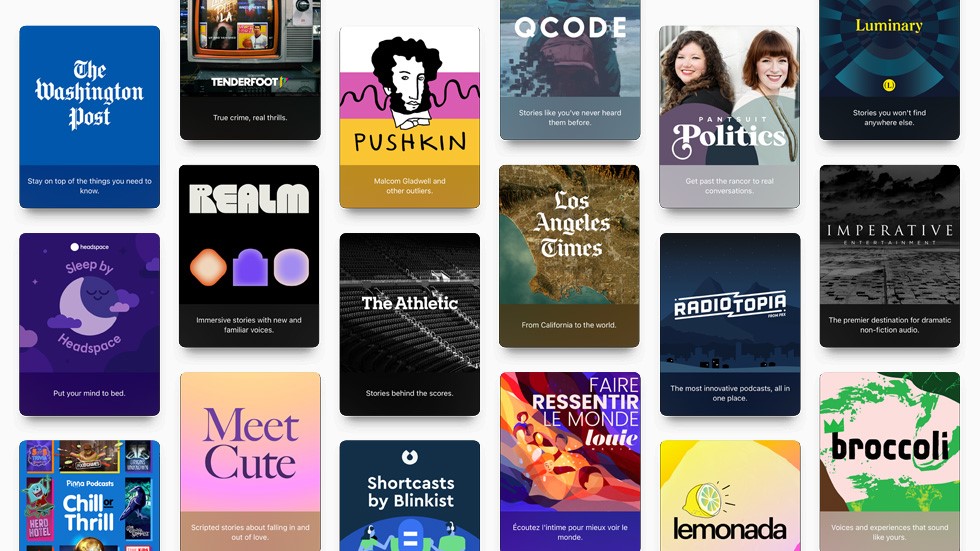
People often confuse “straight to the point” with plain and simple. However, it is an unjust explanation of what is straight to the point. Additionally, achieving the “straight to the point” scale is not simple.
Put, “straight to the point” means something that best projects your podcast theme with a user who has never even engaged with your podcast. For instance, if your podcast discusses movies, then do not simply design a podcast cover with the blockbuster sign.
Instead, brainstorm ideas for what you often differ in the podcast, like a specific genre or movie series. Once you narrow down the ideas, you can design a podcast cover that is straight to the point, i.e., it conveys the message creatively.
Here are some examples to help you think in the “straight to the point” fashion:
Example #1 ― Entrepreneurs like it simple, plain, and sophisticated.

The above podcast cover designs are related to business. If you carefully review each of them, you will find the human element. The human element is a necessary factor in business-related podcasts. It is what allows business professionals to connect with the experts and attracts them to the podcasts.
Another thing to review is the color palettes used by the entrepreneurs. The colors used in the podcast cover photos by hosts are often subtle yet bright and reek of sophistication.
Example #2 ― Comedians Making the Most from Their Podcast Cover Photos.

Comedy podcasts don’t seem like much, but they have a huge user following. Do you know how? Well, they attract users in bulk with their funky, impressive, and immersive cover images. Notice the clever use of colors on all the podcast cover designs. Moreover, the typography used in these cover images is also unsophisticated and often conveys that this isn’t something serious.
3. Avoid Inappropriate Words or Imagery
Swearing and inappropriate imagery is part of today’s taboo culture. However, it offends users. You have to retain that the podcast-listening community is an informed one. It’s not about becoming cool, but it’s about delivering cool information.
Not to mention, using explicit languages is also restricted by podcast directories, like Apple Podcast and Spotify. So, you may also get banned for using offensive words or imagery in your podcast cover photos.
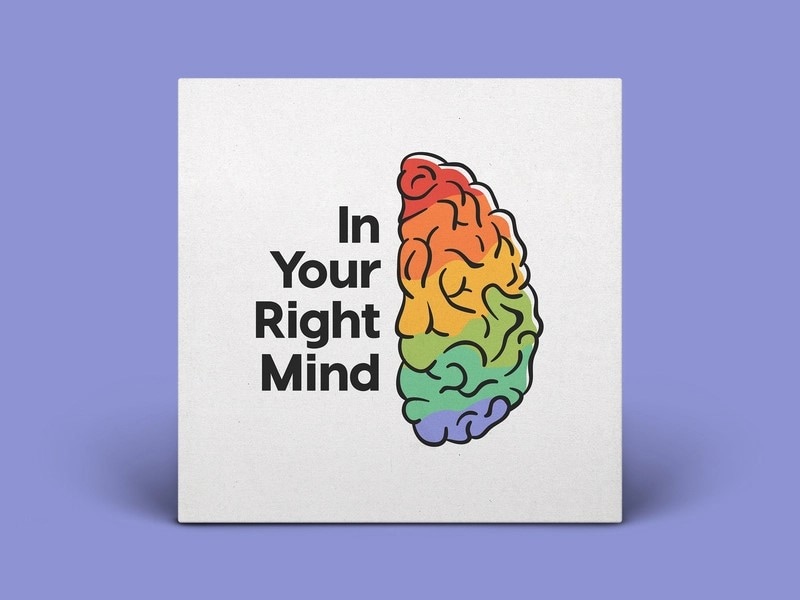
The recent policies of podcast directories like Apple Podcast have changed drastically. For instance, you could have gotten away with using asterisk marks in some words (like sh*t); however, it is not the case today. Your podcast will receive multiple notifications from the platform managers to remove the banner, and in some cases, the directories can also ban you from the platform. So, it is best to play it safe and use professional language, at least in the podcast cover photos.
4. Color Matters
There are trends in book cover design and movie cover design, and then comes the trends in podcast cover design. You will be surprised to know the amount of time each podcaster spent on deciding the right color for the cover art.

Color is something that not many businesses pay attention to, but it has a profound effect on users. To just give you an example of how deep businesses think about the color of their business, there is a separate domain after colors: color branding.
Yes, businesses spent a lot of brainstorming sessions to combine color theory and business. Here are some of the most prominent trends in the podcast world today and their significance:
Example # 1. Red background with light text
If you are into sales, you might already be familiar with the concept of red. Basically, red is the color of love, excitement, and anger. And the combination of these emotions allows businesses to create a sense of urgency among users. You can use the same psychology in the podcast world and let new users discover you through this psychological trick.
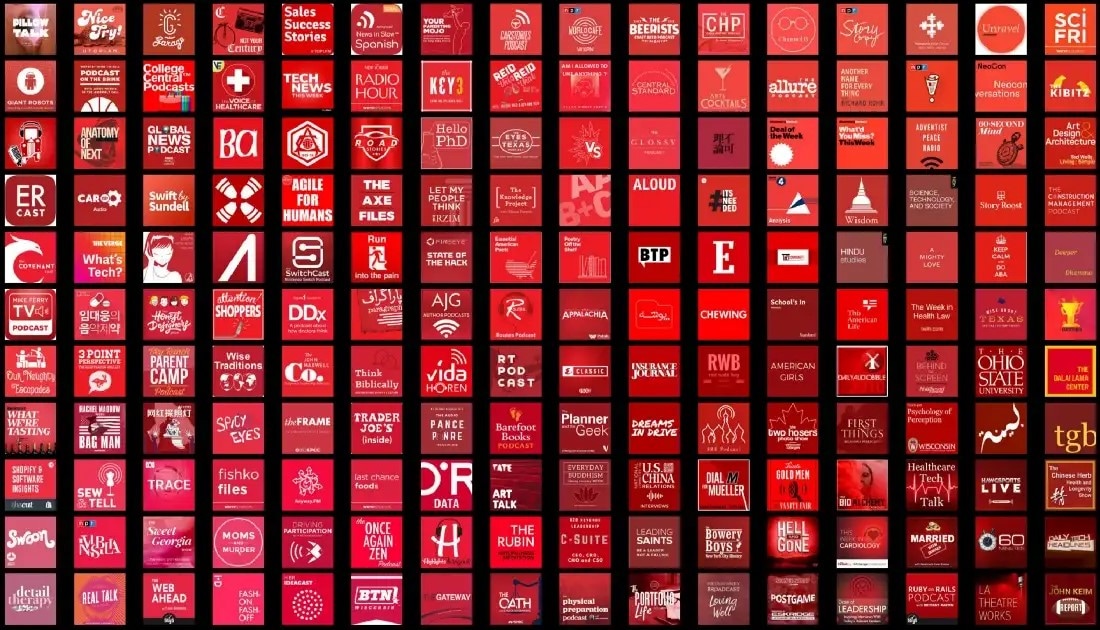
Today, almost all domains in the podcast world use the red color and combine it with black or white text to entice users about their podcast episodes. You can find such podcast covers on topics ranging from history to anthropology, psychology to music, and so on.
Example #2. Blue background with light text
Blue is the color of trust, competency, and quality. To loosely translate its psychological effects on an average human, blue creates a sense of dependability, logic, and peace. So, if your podcast is on medical topics or something calm, a blue podcast cover photo is the way to go.

There are numerous other examples like this. For instance, even black ink on a grey palette is a trend. After studying their psychological effects on your users, you can choose from any number of colors and combinations.
It is important to retain that color psychology is not about tricking people. Instead, it is about learning the effects of color on people mind’s and using one that best describes your episodes. So, research this in-depth and choose a color that resonates with your content and also impresses users.
5. Typography will help
A debate that long started at the advent of the internet and is still continuing is the effects of fonts on readability. Some recent studies from Canva have revealed that fonts have a lot to do with readability. But most important of all, fonts have a huge effect on people’s emotions.
For instance, serif fonts have long been used in newspapers, magazines, and even web pages. That is why most users associate serif fonts with classical, nostalgic, and often professional or formal. And it is thus suitable when you are creating a professional podcast discussing business, education, and so on.
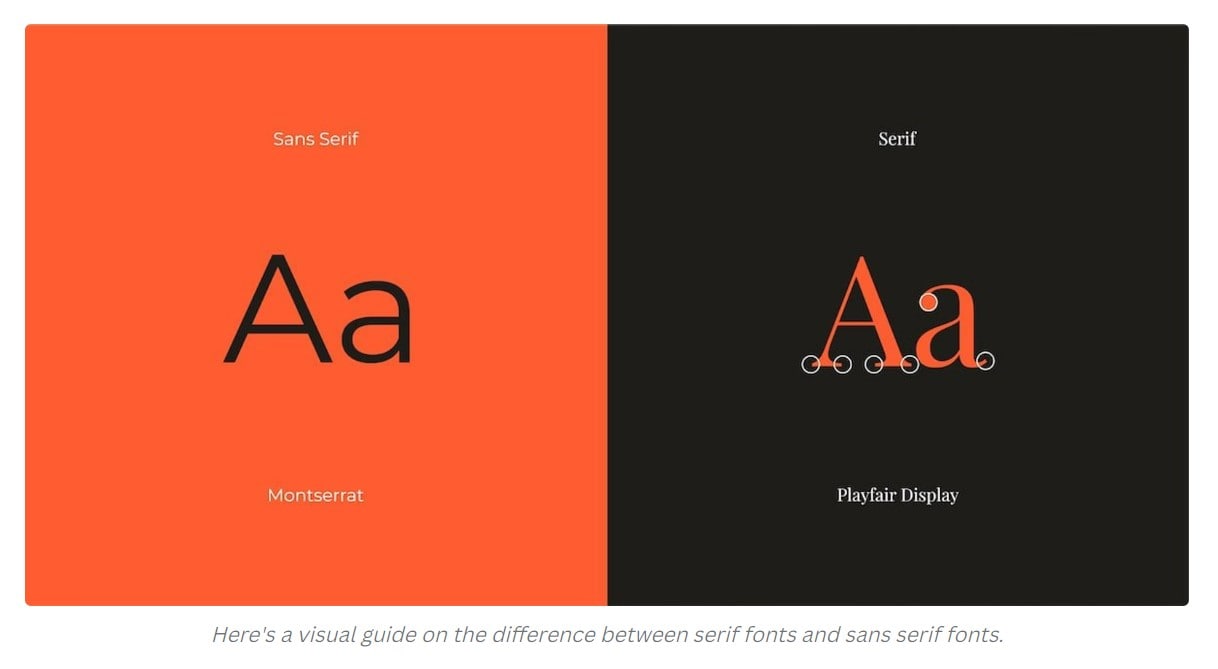
Sans serif is the new thing. It is all about throwing the tradition of using Serif fonts out of the window and using a fun and exciting and allowing users to read conveniently on the web-pages.
But typography does not mean it’s all about the font itself. The size of the font, the spaces in between the fonts, and the color of the font all play a differential role. So, ensure to learn about all the intricacies of typography and accordingly use fonts, their size, the gap in between them, their color, and so on.
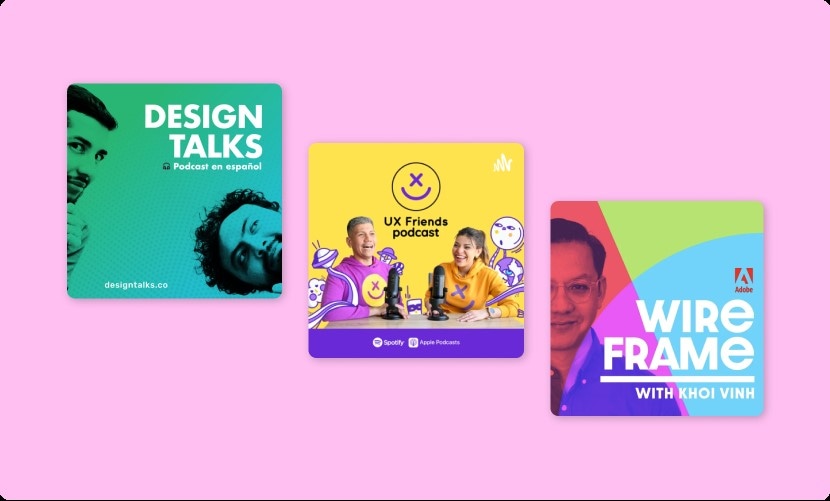
Additionally, you should focus on blending the typography with imagery. The combination of both often becomes messy and unreadable; of course, the creativity lies in
6. Unique and high-resolution images
A unique picture is what differentiates you from others. A user can easily locate and revisit your episodes if you use a unique-looking podcast cover. However, in addition to the unique design of the podcast cover, you should also ensure it is in high resolution.
Retain that a high-resolution picture speaks about class, professionalism, and sophistication, regardless of what you discuss in the podcast. At the same time, a low-resolution podcast is unsuitable and looks un-classy in the digital era.
7. Brand consistency
Of course, A/B testing in the initial phases is necessary to test the design of the podcast cover. However, such tests are suitable for a short period of time. Ensure to spend enough time beforehand, so you do not have to change the design of the podcast cover often.
Brands like Coca-Cola, Nike, and Apple use consistency in their images and logos and ensure that all platforms have a similar brand image. This allows the users to recognize the brand, and the picture sits in the user’s mind. So, ensure consistency across all platforms and use the same cover images on all podcast directories.
8. Image compression
Almost all podcast directories will recommend you compress the podcast cover image, and for good reasons. Firstly, a small image loads faster on the pages and allows users to interact with your podcast at first sight. Second, mobile apps and web pages are very different in nature from web platforms. And a lot of users listen to the podcast via their smart phones, so it is best to use compressed images.
An ideal podcast cover art dimension is 3000 x 3000 pixels, which is a 1:1 aspect ratio.
Some podcast platforms, like Buzzsprout, do the image compression on their end. So, ensure not to compress the image beforehand, as this will further shrink the size of the image.
9. Design for a variety of sizes and re-purpose your art
When you design the podcast cover, it is best to take different aspect ratios and dimensions and sketch your plan. This will allow you to be more creative, and of course, you can easily resize the banner for respective podcast directories.
Bonus Tip: Make an Attractive Podcast Cover Easily with Filmora
Now that you know how to choose color, font, typography, and content for the podcast cover art, let’s learn how to combine all these elements and design a podcast cover that is unique, different, and impressive.
However, using an effective tool like Filmora to design podcast covers is important. Yes, there are hundreds of other tools for podcast cover design. But Filmora stands out, given it includes everything one needs to create an impressive podcast cover image.
Wondershare Filmora is an all-inclusive tool for designing impressive and unique podcast covers. Its stock library allows you to access premium content from sites like Pixel, Giphy, and its own film stock. It means you can choose from millions of images and create the most impressive podcast banner.
Free Download For Win 7 or later(64-bit)
Free Download For macOS 10.14 or later
Also, this tool allows you to manage every aspect of the image and add text, photos, colors, graphics, and more to the podcast cover image. You will find options to control the topography, color correct each element on the podcast banner, and change the elements’ size.
Above all, Filmora is a self-explanatory tool with a clean and modern interface that even beginners will find simple to use.
Key Features
- Use an image from the stock and customize everything. Add texts, photos, colors, graphics, and more.
- Remove the background from any image with a single click; Filmora includes AI-background remover.
- Use vector graphics and other elements to make your design outstanding.
- Customize the color of texts, elements, and graphics.
- Color correct the image.
- Export in any resolution, format, and custom dimension (dedicated options available).
How to make a podcast cover with Filmora?
As indicated, Filmora is really simple to use. Regardless of whether you’ve used a podcast cover-making tool before or not, Filmora will feel easy and quick. Here’s how to make a podcast cover with Filmora:
Step1 Download and Install the Filmora Video Editor on your Mac or Windows computer.
Step2 Launch the installed app and click Create a New Project. Then, click Stock Media at the top.
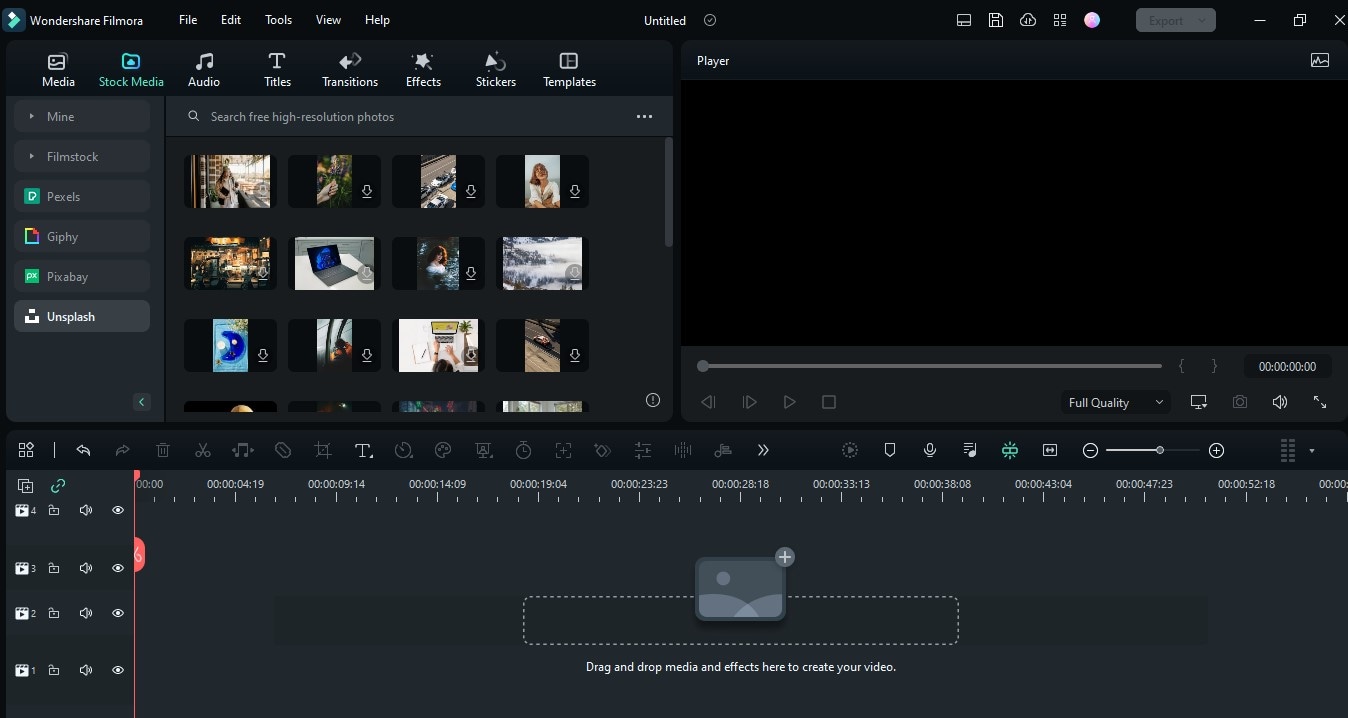
Step3 You should see a list of the royalty-free image platforms that are supported on Filmora on the left side of the screen. Click a preferred platform (We used Unsplash for this stepwise guide.) and type Podcast in the search bar. Then, drag-n-drop a preferred photo that you wish to use for your podcast cover photo to the Timeline.
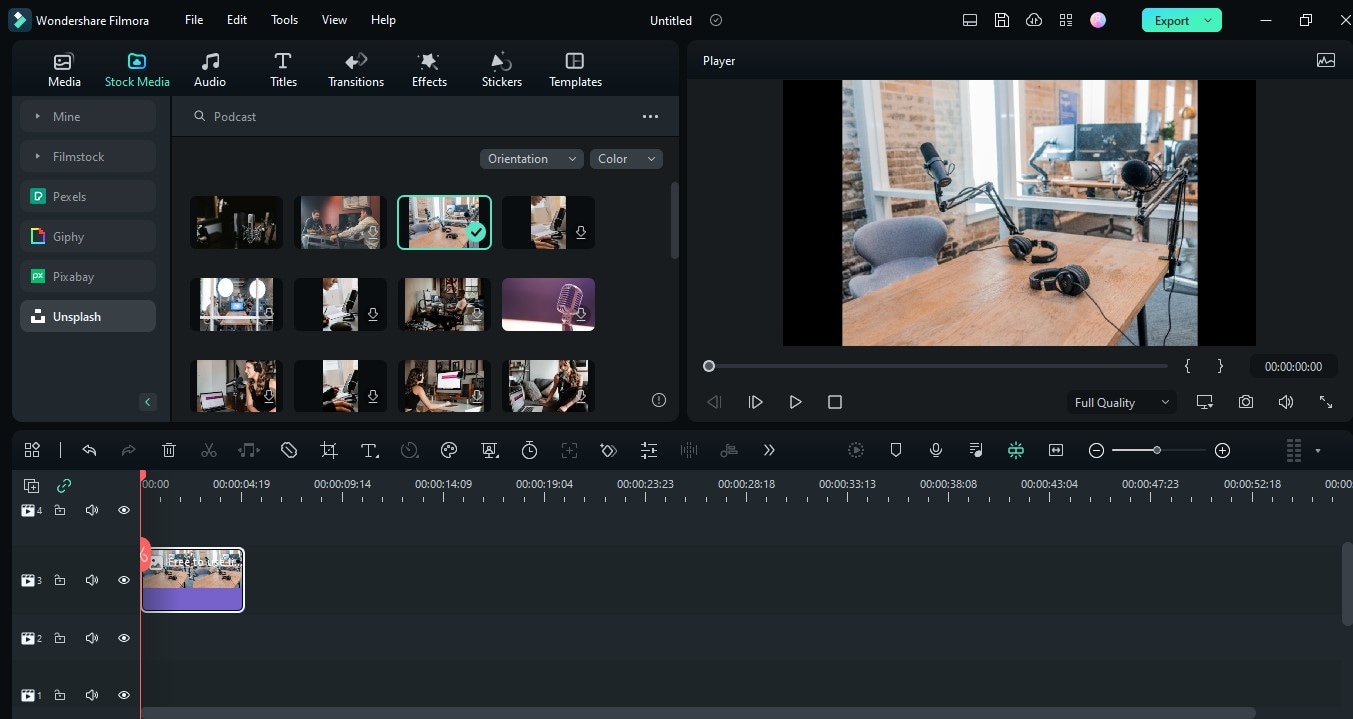
Step4 Navigate to the top of the timeline and click the Text icon. Then, select Quick Text or 3D Text, depending on your requirements.

Step5 A pop-up window should appear on your screen. Click Title > Basic > then enter the title of your podcast show in the relevant area. After that, adjust the font, font size, and text color. You can also make the text animated by clicking Animation at the top of the pop-up.
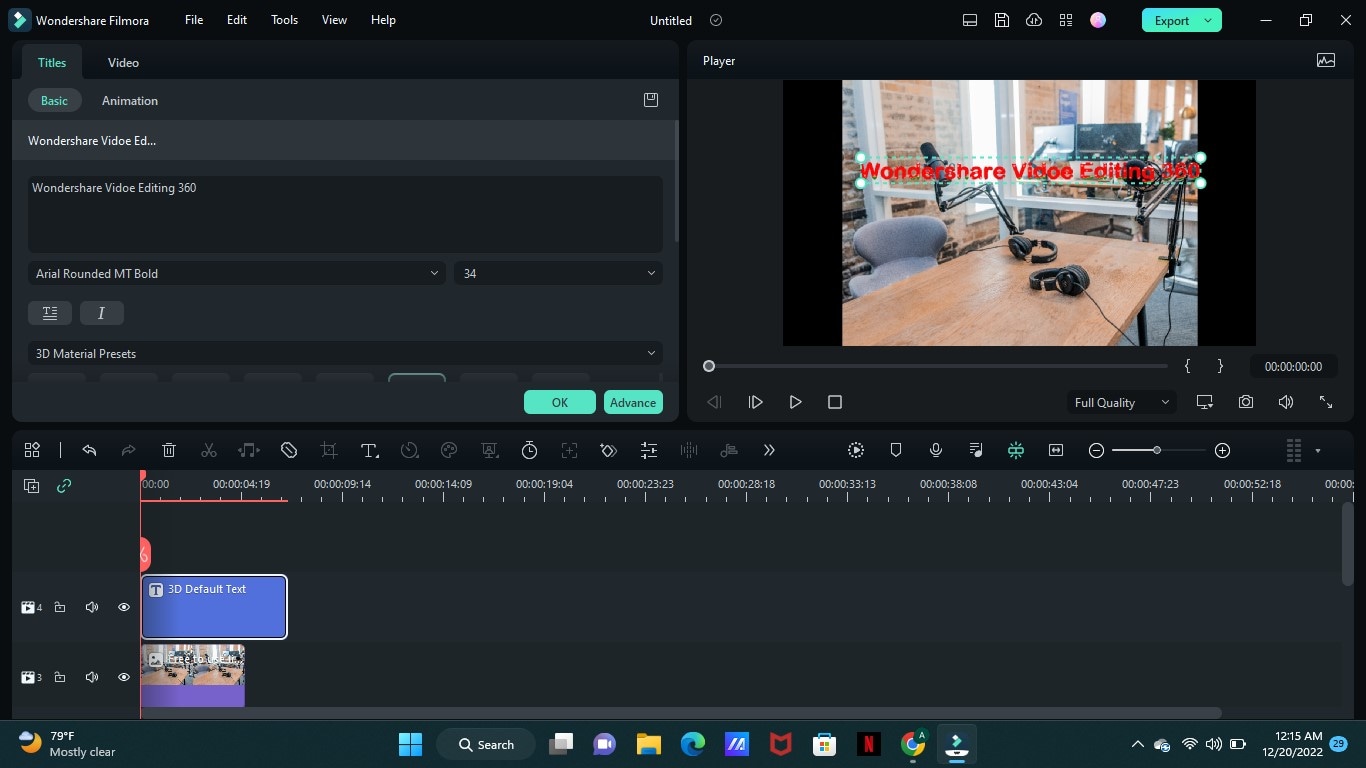
Step6 Once you complete the settings. Click OK > Export. Then, from the pop-up that appears, enter the file name in the relevant area and select a preferred location to save the p[ocast cover photo. Then, click Export to finish.
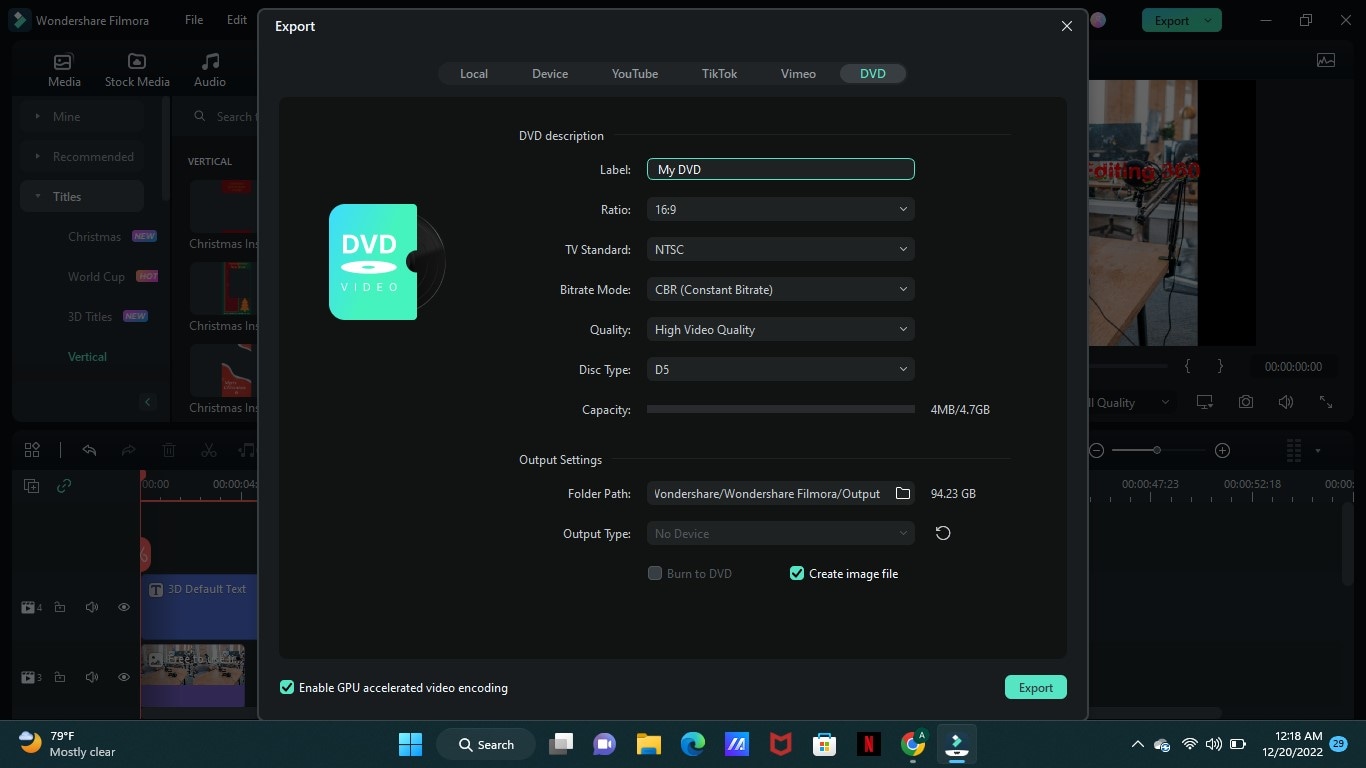
Summing Up
Hopefully, you have a clear idea of what elements to manage in your podcast cover and how to make a podcast with Filmora. Retain that there is no such thing as a perfect podcast cover photo.
However, your podcast cover image can outshine competitors if you work on all the elements suggested and blend them into beautiful imagery.
Free Download For macOS 10.14 or later
Also, this tool allows you to manage every aspect of the image and add text, photos, colors, graphics, and more to the podcast cover image. You will find options to control the topography, color correct each element on the podcast banner, and change the elements’ size.
Above all, Filmora is a self-explanatory tool with a clean and modern interface that even beginners will find simple to use.
Key Features
- Use an image from the stock and customize everything. Add texts, photos, colors, graphics, and more.
- Remove the background from any image with a single click; Filmora includes AI-background remover.
- Use vector graphics and other elements to make your design outstanding.
- Customize the color of texts, elements, and graphics.
- Color correct the image.
- Export in any resolution, format, and custom dimension (dedicated options available).
How to make a podcast cover with Filmora?
As indicated, Filmora is really simple to use. Regardless of whether you’ve used a podcast cover-making tool before or not, Filmora will feel easy and quick. Here’s how to make a podcast cover with Filmora:
Step1 Download and Install the Filmora Video Editor on your Mac or Windows computer.
Step2 Launch the installed app and click Create a New Project. Then, click Stock Media at the top.

Step3 You should see a list of the royalty-free image platforms that are supported on Filmora on the left side of the screen. Click a preferred platform (We used Unsplash for this stepwise guide.) and type Podcast in the search bar. Then, drag-n-drop a preferred photo that you wish to use for your podcast cover photo to the Timeline.

Step4 Navigate to the top of the timeline and click the Text icon. Then, select Quick Text or 3D Text, depending on your requirements.

Step5 A pop-up window should appear on your screen. Click Title > Basic > then enter the title of your podcast show in the relevant area. After that, adjust the font, font size, and text color. You can also make the text animated by clicking Animation at the top of the pop-up.

Step6 Once you complete the settings. Click OK > Export. Then, from the pop-up that appears, enter the file name in the relevant area and select a preferred location to save the p[ocast cover photo. Then, click Export to finish.

Summing Up
Hopefully, you have a clear idea of what elements to manage in your podcast cover and how to make a podcast with Filmora. Retain that there is no such thing as a perfect podcast cover photo.
However, your podcast cover image can outshine competitors if you work on all the elements suggested and blend them into beautiful imagery.
Also read:
- [New] 2024 Approved Leveraging Facebook Slides A Beginner's Handbook for Visual Storytelling
- [New] ClearShot Video Amplifier - Cross-Device Compatible
- [New] In 2024, Unified Imagery The Ultimate Blend Strategy
- [New] Unlock Flawless Selfies with These Top iPhone Free Tools
- [Updated] Virtual Vanguard 10 Most Liked YouTubers
- [Updated] X1000 Video World Comprehensive Sony Examination for 2024
- In 2024, Elite Video Management on Your Windows Phone
- In 2024, Master Level Editing The Essence of Smooth Transitions in Inshot
- In 2024, Navigating to Your Personal YouTube Collection
- The Most Useful Tips for Pokemon Go Ultra League On Xiaomi Redmi A2+ | Dr.fone
- The Ultimate Cinemagraph Guide - Top 5 Must-Know Tactics
- Title: [Updated] In 2024, Proven Techniques to Stand Out in Podcast Imagery
- Author: Gary
- Created at : 2024-12-24 03:48:29
- Updated at : 2024-12-25 00:14:28
- Link: https://article-knowledge.techidaily.com/updated-in-2024-proven-techniques-to-stand-out-in-podcast-imagery/
- License: This work is licensed under CC BY-NC-SA 4.0.